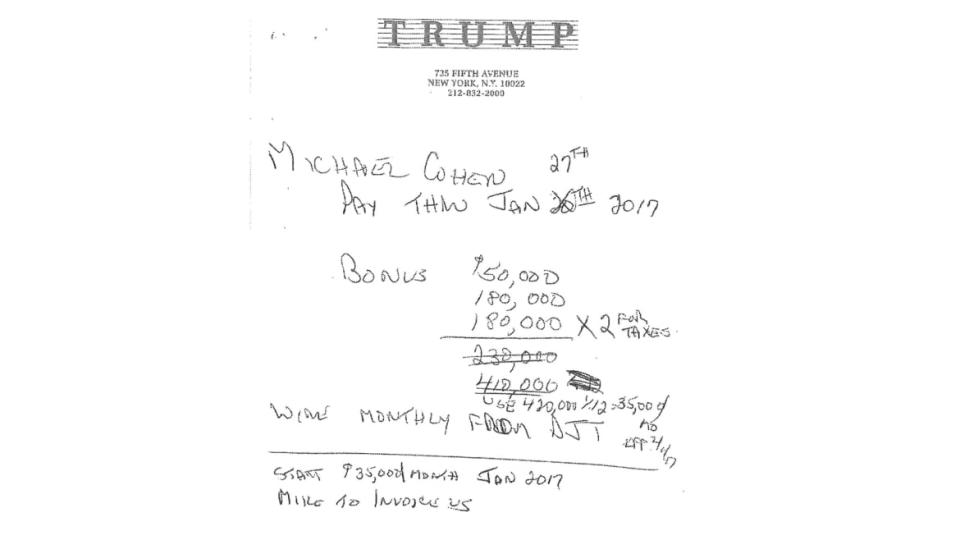Trump Accountant on His Stormy Daniels Coverup Notes: ‘I Made a Boo-Boo’

Jurors who will determine Donald Trump’s fate got their first look at the damning paperwork tying the former president to his porn star hush-money coverup, with testimony from the buffoon accountant who took notes of a meeting that set it in motion.
“I made a boo-boo,” Jeffrey S. McConney admitted when describing the erroneous math he scribbled on “TRUMP” corporate letterhead.
The former Trump Organization controller testified about the notes he took during a January 2017 meeting that laid out how the family real estate company was going to surreptitiously reimburse attorney Michael Cohen for fronting the $130,000 that silenced the porn star Stormy Daniels. That payment kept her from going public about her decade-old, one-night stand with Trump in the days before the 2016 presidential election.
The farce was laid out in black and white, with handwritten notes explaining the fuzzy math at play.
Justice Juan Merchan Gives Two Strikes Trump a Final Warning: Jail Is Next
Cohen would be paid $180,000, which was doubled on paper so that it would make up for the roughly 50 percent taxes the Midtown Manhattan resident would have to pay in federal, state, and city taxes. McConney wrote “180,000 x 2 for taxes” in black pen on the bright white paper. On the witness stand, he admitted the company was fine having it “grossed up” to ensure Cohen got his proper share.
The sham continued when tallying up Cohen’s bonus. Initially $50,000 was marked as “paid to Red Finch for tech services” but that seemed to morph instead to mean $60,000 for Cohen himself.
“Michael was complaining that his bonus wasn’t large enough. This was to make up for whatever he thought he was owed,” McConney testified.
The total $420,000 was then divided by 12 so that Cohen would get $35,000 each month for a year. McConney’s notes of that meeting included a mention that stated “Mike to invoice us,” the genesis of what prosecutors say would later be Cohen invoices for fake legal work that Trump gladly paid to keep the hush money deal under wraps.
Monday’s testimony also connected Trump directly to the process, a major step forward in the case. Prosecutors showed jurors a copy of a March 28, 2017 email in which McConney wrote, “I’ll check status tomorrow. DJT needs to sign check.”
On the stand, McConney explained that authorizing the money transfers would require having someone actually go to the White House have the then-president of the United States approve the payment himself—while he was president.

But in an instance that exemplifies the lack of intellectual rigor involved in this operation, at least one of those checks disappeared on its way back north from Washington to New York City.
After three monthly payments to Cohen in January, February, and March, McConney asked an employee in the Trump Organization accounting department, Deborah Tarasoff, to cancel a check cut in April that didn’t return.
“It looks like we never got a check back from the White House. It got lost, somebody couldn’t find it. I guess it’s the same as lost,” he testified.
Paperwork showed that after $105,000 was paid by The Donald J. Trump Revocable Trust, the bean counters back in Manhattan realized it would be easier to run the next $315,000 in payments through Trump’s personal accounts for the rest of the year.
Matt Colangelo, a prosecutor with the Manhattan District Attorney’s Office, meticulously went through each of Cohen’s 12 invoices. Every month in 2017, Cohen would email Allen Weisselberg, a disgraced accountant who was then the Trump Organization’s chief financial officer but has since been convicted of tax fraud and spent three months at New York’s dreaded Rikers Island jail. Cohen would deliver a curt greeting—mentioning some summer fun, a hurricane hitting Weisselberg’s Florida home, Thanksgiving, the winter holidays—then get right down to business.
“Pursuant to the retainer agreement, kindly remit payment for services rendered,” Cohen would email Weisselberg, each time proudly signing his emails: “Michael D. Cohen, Esq. Personal Attorney to President Donald J. Trump.”
Trump Hush Money Trial Week IV: A New Hope
One by one, Colangelo went over every monthly email, attached invoice, forwarded Weisselberg email, and McConney’s copy over to Tarasoff. By the time they got to September, McConney was starting to wear down.
“$35,000,” he said, sounding increasingly tired of answering why he knew how much to pay despite there not being any dollar figure on the invoice for supposed legal work. The answer was always the same: that first meeting in January 2017.
“It’s an invoice from Michael Cohen,” he groaned when discussing the October paperwork.
When Colangelo asked him to read the email, McConney let out a mild whine. “The whole thing?” he asked.
“Why don’t we just do the body this time,” Colangelo acquiesced.
The internal Trump corporate emails showed how invoices made their way from Cohen to Weisselberg to McConney to Tarasoff. And the chain would generally end the same way.
Get the Daily Beast's biggest scoops and scandals delivered right to your inbox. Sign up now.
Stay informed and gain unlimited access to the Daily Beast's unmatched reporting. Subscribe now.


